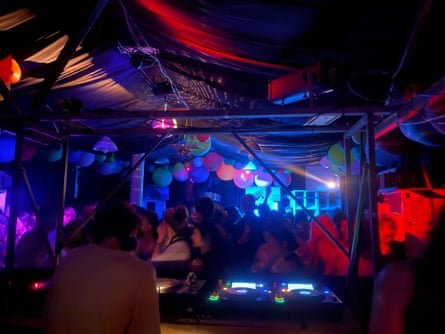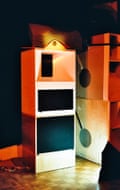B
In 2013, the career of British music producer Floating Points was rapidly advancing. He was frequently DJing at popular nightlife venues like Warehouse Project and Fabric, and was even traveling internationally. However, when he received an invitation to perform at Cosmic Slop, a small 200-person event held in a former brass and iron works in Leeds, he knew he couldn’t pass it up. The word was spreading about the impressive hand-built speaker system, highly regarded by underground icons like Theo Parrish and Bradley Zero. Floating Points made the journey and was instantly captivated, vowing to return even before his set had ended. He has since performed at Cosmic Slop an estimated 30 times, and after all his experience as a DJ, it remains one of his favorite places to play.
Since its inception in 2009, this small club night in the north has left a lasting impact on many, not just because of its impressive sound system. What was originally intended as a one-time fundraiser quickly gained popularity for its combination of excellent music and community involvement. Each event is held to support the resident charity at Cosmic Slop’s venue: Hope House – MAP, which offers alternative education for at-risk youth in West Yorkshire who may be excluded from traditional schools. Throughout the week, the venue also hosts workshops and classes in nearby rooms. “It’s interesting because Slop is known as one of the best clubs in the world, but at its core, it’s just a party that supports a charity doing incredibly important work,” says Sam Shepherd, also known as Floating Points. “It’s a win-win situation for everyone involved.”

Display the image in full screen mode.
However, in 2017, there was a possibility that Cosmic Slop would have to shut down because the Grade II-listed building was being sold and would be converted into apartments. Tom Smith, one of the co-founders, expressed concern over the potential loss of the space, stating that it has become increasingly challenging for spaces like this to survive and for them to continue offering support to young people.
Both sides of the event are highly dedicated: popular DJs such as Four Tet, Mr Scruff, and Caribou perform without pay in order to raise the most funds, and each event draws long lines down the otherwise unremarkable street before the guest is even revealed. By 11:30pm, the door staff must implement a one-in one-out policy due to high demand. However, despite the exclusivity and top-notch sound system, the atmosphere is far from serious or pretentious. The cozy room is decorated with curtains and lampshades, there is a DIY bar with fresh fruit available, and the friendly staff make it feel almost like a living room.

Display the image in full screen mode.
Gilles Peterson, who performed at Cosmic Slop in 2017, describes the event as the complete opposite of the typically commercialized club culture. He explains that upon entering, one can feel the genuine passion and dedication of the promoters and organizers. This positive energy then translates into the audience and creates an ideal atmosphere for Peterson as a DJ.
The policy of open music allows for a diverse range of genres, including rare jazz, disco, and modern trap music, to be played at events. The selection is based on mood rather than strict categorization by genre or BPM. According to Shepherd, this type of atmosphere and audience allows for the freedom to play a variety of music that he truly enjoys, both dancefloor hits and unconventional choices such as folk, percussion, Brazilian soap opera themes, and even a recording of frogs with a techno-like sound.
Inspired by the sounds of 3 Chairs and events like The Loft in Detroit, it is not uncommon to listen to a track in its entirety, including any imperfections, before moving on to the next one. This traditional approach is becoming less common in modern clubbing, where the focus is often on dramatic drops and fast transitions. Smith reflects, “What if the song has a captivating introduction? You could skip ahead to the beat, but you might miss out on the best part. It’s a different way of experiencing the music.”
After overcoming the threat of redevelopment, Smith is feeling positive. MAP purchased Hope House in 2019 after a successful two-year fundraising campaign, securing a future for both the classrooms and the club. This month, the team is launching a new offshoot label that will handle all aspects of production, from recording to dubplate cutting and sleeve printing. The first releases will be from long-time friend and supporter Four Tet, including a cassette version of their digital-only album 871 and a limited edition run of their new album later this year, featuring custom artwork by MAP students. Smith states, “We have a great opportunity to share what we have with a wide audience.”
This serves as a reminder of the benefits that grassroots clubs can offer when they have sufficient resources. Peterson explains that it is challenging to sustain these establishments without steady income, as they rely on energy. Therefore, it is crucial for these places to continue receiving new energy to maintain their vibrant atmosphere.
Source: theguardian.com


